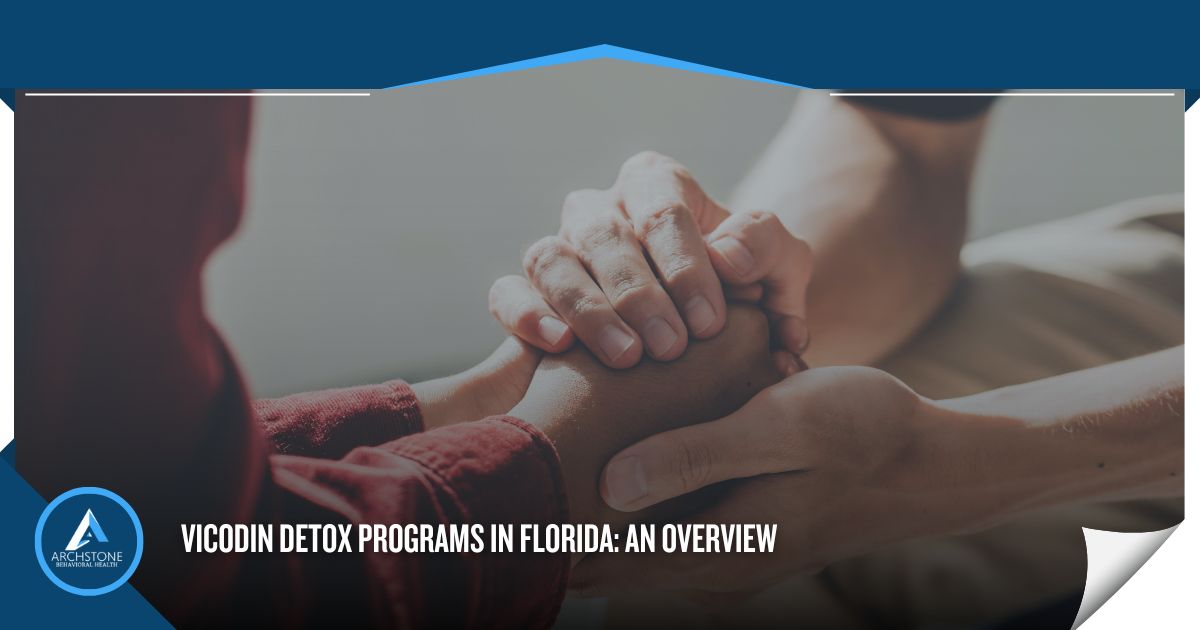Vicodin Detox Programs in Florida: An Overview
Get Help Now
Vicodin is a highly addictive opioid medication. Hydrocodone is an active ingredient in Vicodin and other prescription pain relievers like Norco and Lortab.
When people misuse opioid painkillers like Vicodin, they may become physically dependent on them. Even those using prescription opioids as directed may develop tolerance and other symptoms of physical dependence.
When people become physically dependent on Vicodin and other opioids, they may lose the ability to control their substance use. People with Vicodin addiction require comprehensive treatment to stop using this potent drug and avoid relapse.
Vicodin addiction treatment typically begins with a medication-assisted treatment program to help people remain safe and comfortable during the detox process. This article will explore Vicodin addiction and provide an overview of what to expect in a Vicodin detox in Florida.
Contact the specialists at Archstone Recovery now to learn about our comprehensive treatment programs or to schedule an intake in our Vicodin detox center.
Vicodin Addiction: Understanding the Basics
Doctors frequently prescribe Vicodin to help patients manage pain after an injury, surgery, or during the treatment of other medical conditions. Vicodin contains a combination of hydrocodone (an opioid) and acetaminophen (the active ingredient in Tylenol).
Vicodin effectively relieves pain by disrupting pain signals between the brain and body. The hydrocodone in Vicodin binds to opioid receptors in the brain involved in pain relief, emotional regulation, and pleasure.
People who take Vicodin may experience euphoria–a warm, pleasurable feeling and general contentment. These pleasant effects may make people want to take more Vicodin than prescribed and longer than prescribed. Over time, people may need to take higher doses of Vicodin to get the desired effects.
People who misuse Vicodon may develop symptoms of dependence or addiction. Vicodin abuse can cause unwanted side effects and complications. It’s essential to be aware of the signs of Vicodin addiction and seek treatment as quickly as possible.
Physical symptoms of Vicodin abuse and addiction include:
- Slow heart rate
- Nausea and vomiting
- Headaches
- Ringing in the ears
- Slow breathing
- Drowsiness
- Muscle weakness
- Feelings of fear
- Depression
- Confusion
- Blurred vision
People who become addicted to Vicodin may steal the medication from others or have several prescriptions from multiple doctors. Substance abuse may quickly take over their life, resulting in noticeable changes in appearance, mood, and behavior.
People who develop symptoms of Vicodin addiction require treatment, beginning with a medical detox program.
Vicodin Withdrawal: Symptoms and Timeline
Many people with Vicodin addiction experience withdrawal symptoms when they stop taking Vicodin. For many, the recovery process can be very uncomfortable and challenging. It’s important to have the support of a professional detox service instead of attempting to stop using Vicodin on your own.
Some of the most common symptoms of Vicodin withdrawal include:
- Flu-like muscle aches
- Excessive sweating
- Stomach cramps
- Diarrhea
- Nausea
- Vomiting
- Itching or crawling skin
- Tremors
- Chills
Everyone has their own experience during detox and withdrawal. However, withdrawal symptoms typically follow a standard timeline.
Here is an example of a typical Vicodin detox timeline.
8-24 hours
Withdrawal symptoms are likely to start within 8 to 24 hours of your last dose of Vicodin. Symptoms include:
- Sweating
- Agitation
- Muscle aches
The support of a Vicodin detox program is critical to avoid relapse during this stage.
24-48 hours
Physical symptoms continue and may worsen. Some people develop insomnia, tremors, and dilated pupils.
48-72 hours
For most, symptoms peak during this stage. People may experience intense nausea, vomiting, severe abdominal cramps, and debilitating diarrhea.
After the first three days, symptoms may subside over the next week. However, some people have lingering depression, insomnia, and anxiety that can last for weeks or months. Mental health conditions like depression and anxiety require treatment and ongoing support.
The amount of time your withdrawal symptoms last depends on your mental and physical health, the type and amount of opioids you used, and other personal factors.
What to Expect in a Vicodin Detox Center
Most people who attempt to detox from Vicodin at home are unsuccessful. The support of a Vicodin detox center will give you the best chance at a safe, complete detox.
In a medically supported Vicodin detox program, medical and support staff will ensure your safety and comfort by providing treatment that includes:
- Medications to reduce cravings and help you manage dangerous or uncomfortable withdrawal symptoms
- Emotional support, including individual, group, and family therapy when appropriate
- Round-the-clock supervision
- Constant access to mental health and medical professionals
- Slow tapering from opioids to reduce the risk of complications and withdrawal symptoms
- Massage, yoga, nutrition support, and other holistic therapies to calm the body and mind
- Aftercare planning or assistance transitioning to other levels of addiction treatment
If you or a family member needs treatment for Vicodin addiction, find an effective Vicodin detox in Florida by contacting the specialists at Archstone Recovery now.
